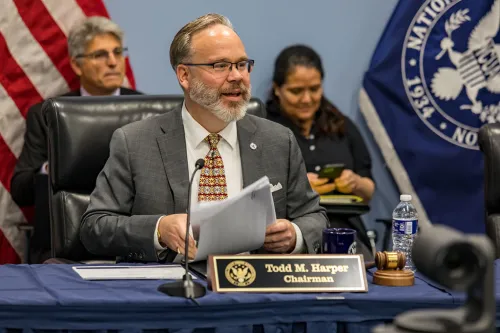NCUA Chairman Todd M. Harper during a meeting of the NCUA Board.
As Prepared for Delivery on November 22, 2024
As mandated by Congress, the NCUA Board is holding this briefing on the staff draft agency budget for 2025 and 2026. Today’s briefing is a dialogue for the NCUA Board to receive stakeholder feedback. This briefing also permits stakeholders to learn more about and better understand the NCUA staff draft budget recommendations. As in the past, we anticipate a collegial exchange from all parties about the issues at hand.
As I’ve noted at previous budget briefings, the NCUA staff draft budget is a starting point for discussion. It’s not a final product. That’s why the NCUA Board is interested in receiving stakeholder input both at today’s briefing and through the comment process. As a reminder, written comments on the staff draft budget are due by Wednesday, November 27. All stakeholders are encouraged to weigh in, even those who are not presenting today.
The proposed combined 2025 budget is $433.0 million, a 12.2 percent increase from the 2024 budget. This figure is $261,000 lower than the 2025 funding level previously approved last year by the NCUA Board as part of the two-year 2024 and 2025 budgets. That’s a tenth of a percentage point lower than the 2025 budget approved last year by the NCUA Board.
The NCUA’s staff draft budget justification includes three separate budgets. The proposed 2025 operating budget is $419.3 million, which is 12.0 percent higher than in 2024. The proposed 2025 capital budget is $8.2 million, or 32.6 percent higher than in 2024. The proposed 2025 Share Insurance Fund administrative budget is $5.5 million, or 7.0 percent higher than in 2024.
This year’s staff draft budget makes critical investments in areas like:
- Ensuring robust cybersecurity in the credit union system and at the NCUA;
- Recalibrating the NCUA’s examination and supervision to provide more time between exams for certain qualifying federally insured credit unions posing fewer risks;
- Making investments to automate processes for new charters and supporting small and minority depository credit unions to build more financial inclusion;
- Enhancing analytical capacity in the areas of fraud, anti-money laundering, quantitative diagnostics, stress testing, and climate-related financial risk; and
- Strengthening the NCUA’s commitment to consumer financial protection.
The draft budget also illustrates how the NCUA is using its resources more efficiently. For example, travel is one of the agency’s largest cost elements. In 2025, the agency projects it will spend $22.1 million. Yet, this figure is approximately $4.7 million, or 17.5 percent, below the pre-pandemic 2019 travel budget of $26.8 million. When coupled with the fact that travel costs have risen considerably in recent years, the staff draft budget demonstrates the agency is completing more of its exam and supervision tasks remotely.
In closing, I recognize the concerns already raised by several of today’s participants in their written statements about the size of the 2025 budget increase, and I am committed to reducing the budget ultimately approved by the NCUA Board in a way that allows the agency to complete its mission of safety and soundness and consumer protection, and to safeguard taxpayers from losses to the Share Insurance Fund. I also look forward to hearing today’s stakeholder presentations. And, I look forward to working with Vice Chairman Hauptman and Board Member Otsuka to reach a consensus on the agency’s budgets for 2025 and 2026.
That concludes my opening remarks. I now recognize Vice Chairman Hauptman.



